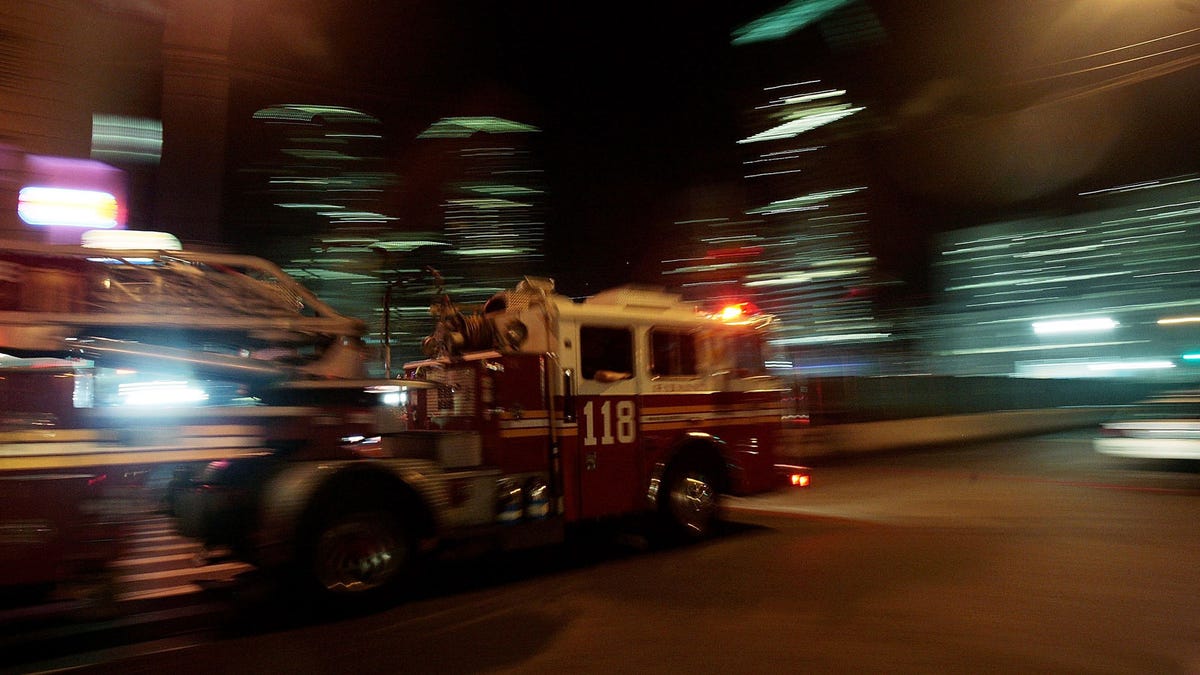New York Fire Trucks Sound Unhappy About Their One (1) Job

Why do fire trucks sound slower than they look? Photo: Chris Hondros (Getty Images)
If you’d asked me as a kid to make a sound like a fire truck, I’d have gladly shouted at the top of my voice “neeeew naaaaw, neeeew naaaaw, neeeew naaaaw,” until someone yelled at me to stop. But then I moved to New York and found out that there’s a whole orchestra of different emergency service sirens to imitate.
But, after figuring out what first responder corresponded to each noise, it struck me that one of these sounds was not like the others. One of these sounds was decidedly depressed about the job it was put on this Earth to do.
That sound is, of course, the wail of the New York City fire truck.
It’s a long, low, lumbering sound that fits the aesthetic of the truck but is a far cry from the mission it is on. Instead of a fast moving high-to-low note that would make the truck sound like it was in a real rush to put out fires, New York’s fire engines sound much less eager to complete the task at hand.
The Fire Department of New York has used the same siren for 20 years. Photo: Fire Department of New York
Instead, they blare out an extended note that has only a slight change in frequency. It really sounds like they just don’t want to be there.
It turns out that the apartment I signed for via Zoom from 3,000 miles away is pretty close to a fire station. So I’ve had a lot of time to contemplate the finer points of this siren, and I’ve decided that it sounds as if someone has fallen asleep on a car horn that is gradually running out of air.
Whenever a fire truck leaves the station, first you hear the booming honk of its horn, which is followed by the rumbling of the siren blaring into life. Meeeeeeeeeeeeeeeaaaaaaaaaaaaw it bellows. Meeeeeeeeeeeeeeeaaaaaaaaaaaaw.
That is, until the fire truck hits traffic, and it’s time for a second blast of the horn or a pop of some quickly-paced, high-pitched chirps from a secondary siren.
Me and my partner have discussed this at length, because it’s a weird siren to hear when you’ve lived your whole life with the standard sounds of a European first responder.
It doesn’t command your attention in the same way the police cars or ambulances around New York do. Instead, it’s just loud and echoes ‘round the buildings in a confusing manner. This makes it harder to know which direction the fire truck is coming from when you’re cycling into work in the morning.
I brought this up in the office once, asking why fire trucks sound so sad. And it was evidently not a thought shared by my fellow New Yorkers.
Don’t get me wrong, I don’t want fire trucks to sound cheerful, like some sordid ice cream van patrolling the streets. The somber tones they blast fit the mood of a firefighter’s job much more appropriately. Instead, I was more curious to know why they sounded different?
Is the sound of a NYC fire truck about to change forever? Photo: Bryan R. Smith (Getty Images)
It turns out that fire trucks in New York have used the same siren for more than 20 years. Specifically, it’s a Federal Signal E2QB siren, according to Mark Aronberg, assistant fire commissioner here in the Big Apple.
The 200W siren features a few different sounds, such as a wail, yelp or air horn. It can also be specced with a removable microphone, radio rebroadcast and a public address system. Oh, and it comes with a three-year warranty, which I guess is nice.
For the past few years, this siren has been paired with a Federal Rumbler, which generates low-frequency tones. A complete Rumbler system consists of an amplifier with built-in timer and two subwoofers. This, according to the firm that makes the Rumbler, is enough to ensure that pedestrians “feel” the sound of a passing emergency responder.
Aronberg explained that this has been the “agency choice” for “approximately 20 years.” He also explained that it means the New York fire trucks might sound different to police cars and ambulances as they physically use different sirens.
But, after 20 years of this drawn out wail, there is a threat to New York’s sad-sounding fire trucks.
In 2019, the Wall Street Journal reported that lawmakers were looking to swap the “long, droning sound from first responder vehicles to a European-style, high-low sound.”
In March 2019, a bill was passed by City Council members in New York and this set out a transitional period in which first responders had to switch onto a more “European” siren. The move followed a trial carried out by the city’s Mount Sinai Hospital and its fleet of 45 ambulances.
So, after growing to love the sad-sounding fire trucks that drive past my apartment on an hourly basis, it sounds like this unhappy din might not be part of my soundtrack to the city forever.


